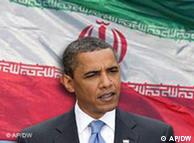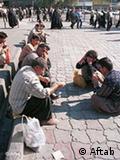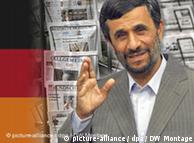IRAN | 04.08.2009
Ahmadinejad unfazed by criticism as his second term gets underway
German Chancellor Angela Merkel left no one in any doubt about her views. After the presidential elections in mid-June in Iran she blamed the government for the escalation of violence on the streets of Teheran. "I recall from my own experience in eastern Germany,” she said, “how important it is that people care about the whereabouts of other people."
Initially the United States held back on any form of explicit condemnation. In March President Barack Obama had even reached out to Iran congratulating the Islamic state on its New Year celebrations. After the elections Obama reminded Teheran of its responsibility for human rights. But he avoided interfering explicitly in Iran's interior matters. On the contrary, he remains interested in a dialogue.
 US President Barack Obama says he is still interested in a dialogue with Iran"To start a dialogue is still on the agenda for Obama," says Deutsche Welle's Middle East analyst Peter Philipp, "but it will depend of course what sort of dialogue. Ahmadinejad already made some indications that he will not discuss the nuclear issue. He wants to tell the American president how the world should be organized in the future. I wonder if Obama is going to accept these rules."
US President Barack Obama says he is still interested in a dialogue with Iran"To start a dialogue is still on the agenda for Obama," says Deutsche Welle's Middle East analyst Peter Philipp, "but it will depend of course what sort of dialogue. Ahmadinejad already made some indications that he will not discuss the nuclear issue. He wants to tell the American president how the world should be organized in the future. I wonder if Obama is going to accept these rules."
Obama appalled
Pressure from abroad increased when G8 leaders in Italy expressed their concern at last month's summit about the way the Iranian authorities had been dealing with protesters and journalists after the elections.
US President Obama agreed fully with his G8 colleagues when he said: "What we wanted was exactly what we got, which is a statement of unity and strong condemnation about the appalling treatment of peaceful protesters, as well as some behaviour that violates basic international norms: storming of embassies, arresting embassy personnel, restrictions on journalists."
The political leaders of the eight leading industrialized nations gave Teheran until the end of September to reach a deal on its nuclear programme. And last month US Secretary of State Hillary Clinton announced in no uncertain terms that the US would protect its allies in the Gulf region with a missile defense shield if Iran continues pursuing its nuclear ambitions.
Will economic sanctions work?
In that case Iran would have to fear economic sanctions as well. The Obama administration is considering a fuel embargo. Ironically Iran, as a crude oil exporter, has to import refined fuel for its own needs as its antiquated infrastructure increasingly fails to produce enough oil.
 Sanctions may be counter-productive with many Iranians already suffering economic hardshipWhile visiting Deutsche Welle in Bonn last month, Iranian Nobel Peace Prize winner Shirin Ebadi spoke out against economic measures, arguing that they would hit those people already affected by a dire economic situation. She favored political sanctions instead. The withdrawal of European ambassadors, for example, would illustrate political isolation without hurting ordinary citizens, she said.
Sanctions may be counter-productive with many Iranians already suffering economic hardshipWhile visiting Deutsche Welle in Bonn last month, Iranian Nobel Peace Prize winner Shirin Ebadi spoke out against economic measures, arguing that they would hit those people already affected by a dire economic situation. She favored political sanctions instead. The withdrawal of European ambassadors, for example, would illustrate political isolation without hurting ordinary citizens, she said.
Deutsche Welle analyst Peter Philipp is convinced that "Ahmadinejad will continue the same way he has shown us the past 12 years. I don't expect any moderation from his side, because he believes that he has just got the support of the vast majority of the Iranians - I think he really believes in this."
Author: Matthias von Hein (pv)
Editor: Rob Mudge
antigrafikon from dw. kefalonia-kai-kosmos.


No comments:
Post a Comment